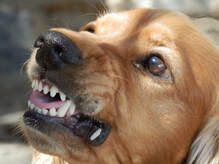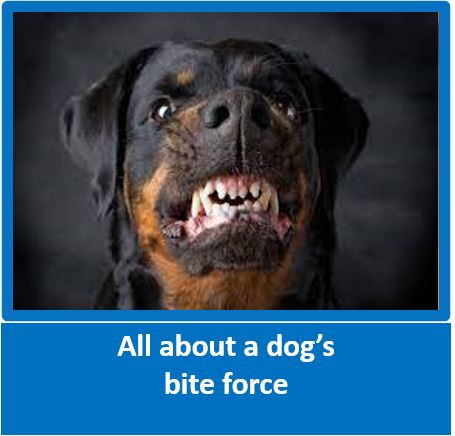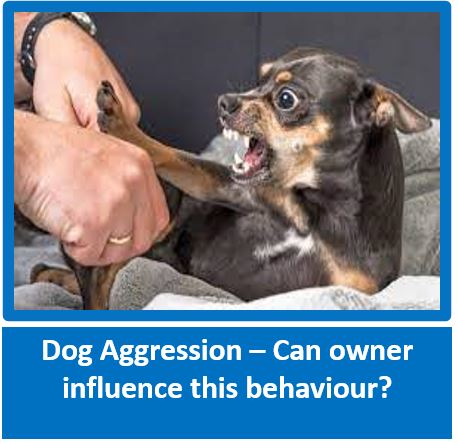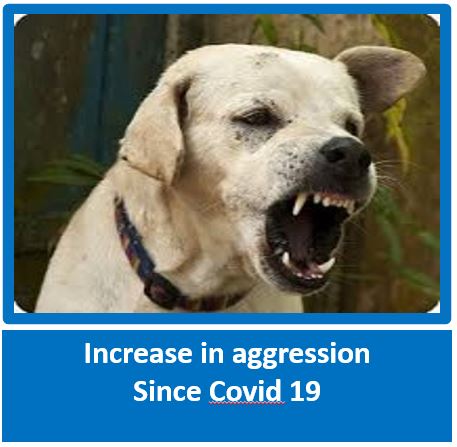
Please visit and LIKE our Facebook Page and share with family, friends and on your own Facebook page, and ask them to share further – it is only by working together and sharing knowledge and education that we can improve the lives of dogs and assist owners. We do not inundate you with posts – an average of 5 per week, and the odd Did You Know. Thank You!
Oh, but he only snapped at my friend, he did not bite!
by Friends of the Dog
 Pic - Veterinary Practice News
Pic - Veterinary Practice News
Many people think that aggression is only when the dog actually bites bites or mauls somebody that it is serious, and is considered aggressive behaviour - not so.
What we often do not realize is that a dog that snaps at somebody, lunges toward them in an aggressive manner, grabs onto trousers, gives a small nip, only reacts to men, etc, is a dog that is in trouble and needs help - this is not a situation to be accepted or ignored!
Approximately 99% of aggressive behaviour is fear based, although you may not think that. It sounds crazy that the dog growling, snapping, lunging around your legs is fearful - if anything you would think the opposite.
What tends to happen with aggressive behaviour, is that it escalates. The dog may have started out just backing away from the person and found that this behaviour worked. Then when the dog performed the same behaviour the next time, the person may have gone towards him, not realizing that the dog was not coping, and the dog was forced to 'up the anti', and this time a growl may be forthcoming, and the person backs away. With the next person, when the behaviour of growling does not work, the dog is forced to escalate the behaviour further - perhaps lunging, barking, and trying to snap. One thing is for sure, when a dog finds out that a behaviour works, it will be repeated, and then becomes a 'learned' behaviour that has to be done whenever necessary, or even escalated more.
The majority of aggressive behaviour comes from a pup not having been properly socialized during the critical 16 weeks period of it's life to as many different people, of all ages and sexes, children, babies etc. You should not stop there, continue socialization as much as possible, always ensuring that it is a pleasant experience for the dog.
Another major factor that does impact is the owners reaction to the behaviour - by shouting at the dog, or even physically hitting it, you are just, inadvertently, making the behaviour stronger. Ignoring the behaviour does not help either, it simply wont go away by itself. We have come across some owners who think the behaviour is totally acceptable, as the dog is 'protecting them' - it is doing its job.
Although aggressive behaviour can be modified in the majority of dogs, and the dog taught to accept the perceived threat, you should never become 'blase' that it has been fixed, and is a thing of the past. Just like us, stress/excitement/circumstances/pain can affect our behaviour, and this applies to our dogs as well, and the dog may revert back to old learned behaviour. You don't need to become neurotic about it, just bear in mind that a possible problem could ensue, and take preventative measures to overcome same, which will be shown to you by the behaviourist you bring in.
Any aggression must be addressed, and by a qualified canine behaviourist, that has had experience with aggression, this is not a behaviour your should try to resolve by yourself.
What we often do not realize is that a dog that snaps at somebody, lunges toward them in an aggressive manner, grabs onto trousers, gives a small nip, only reacts to men, etc, is a dog that is in trouble and needs help - this is not a situation to be accepted or ignored!
Approximately 99% of aggressive behaviour is fear based, although you may not think that. It sounds crazy that the dog growling, snapping, lunging around your legs is fearful - if anything you would think the opposite.
What tends to happen with aggressive behaviour, is that it escalates. The dog may have started out just backing away from the person and found that this behaviour worked. Then when the dog performed the same behaviour the next time, the person may have gone towards him, not realizing that the dog was not coping, and the dog was forced to 'up the anti', and this time a growl may be forthcoming, and the person backs away. With the next person, when the behaviour of growling does not work, the dog is forced to escalate the behaviour further - perhaps lunging, barking, and trying to snap. One thing is for sure, when a dog finds out that a behaviour works, it will be repeated, and then becomes a 'learned' behaviour that has to be done whenever necessary, or even escalated more.
The majority of aggressive behaviour comes from a pup not having been properly socialized during the critical 16 weeks period of it's life to as many different people, of all ages and sexes, children, babies etc. You should not stop there, continue socialization as much as possible, always ensuring that it is a pleasant experience for the dog.
Another major factor that does impact is the owners reaction to the behaviour - by shouting at the dog, or even physically hitting it, you are just, inadvertently, making the behaviour stronger. Ignoring the behaviour does not help either, it simply wont go away by itself. We have come across some owners who think the behaviour is totally acceptable, as the dog is 'protecting them' - it is doing its job.
Although aggressive behaviour can be modified in the majority of dogs, and the dog taught to accept the perceived threat, you should never become 'blase' that it has been fixed, and is a thing of the past. Just like us, stress/excitement/circumstances/pain can affect our behaviour, and this applies to our dogs as well, and the dog may revert back to old learned behaviour. You don't need to become neurotic about it, just bear in mind that a possible problem could ensue, and take preventative measures to overcome same, which will be shown to you by the behaviourist you bring in.
Any aggression must be addressed, and by a qualified canine behaviourist, that has had experience with aggression, this is not a behaviour your should try to resolve by yourself.




